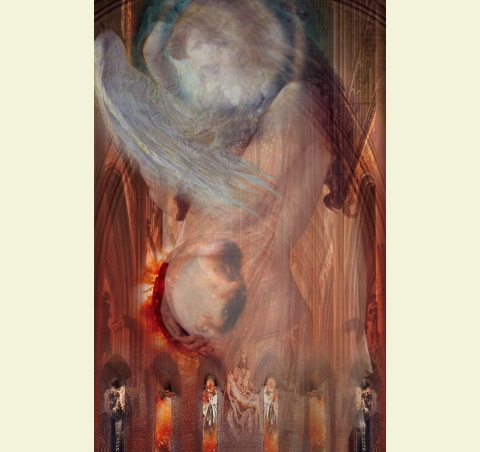Day Three:
Pregnant with God

Bruce Manwaring The Holy Thing. Giclee Print 2005, 20 " x 31 ". Used with permission all rights reserved. To purchase prints or original artwork please visit the artist’s site.
From CIVA Exhibition: Highly Favored: Contemporary Images Of The Virgin Mary
Pregnancy is an amazing thing—to have another person actually growing inside of you is a miracle. But what Mary experienced sounds like a science fiction movie. Imagine! A woman has something growing in her that is human, yet more than human. The fetus has taken on the form of a person, but it is completely other, as well. I try to envision what Mary might have felt, knowing that the unborn child growing in her was also the Holy God, Creator of the universe. It’s mind blowing. Singer and comedian, Mark Lowry, tried to capture that amazement in some lyrics he wrote:
Did you know, that your baby boy
Has walked where angels trod
And when you kiss your little baby,
You've kissed the face of God?
Oh, Mary did you know?
Mary did you know?
—from Mary Did You Know
And yet, the real wonder comes when we turn the situation around and look at it from the other side. God in human form was willing to make himself dependent. His body, growing inside of Mary, was completely dependent on his mother’s body. The umbilical cord nourished him. Mary’s body warmed him; her womb protected him. He was vulnerable and frail and without Mary’s body sustaining him, he would have died.
And that seems to fly in the face of everything we know about God. What are we to make of a God that takes on a position of weakness and dependence? We’re tempted to think, “But that was only true about Jesus—not God the Father.” Really? Jesus told his disciples that if they had seen him they had seen the Father. And the scripture from Colossians that we read today says that Jesus is the “image of the invisible God.” It contains the idea that Jesus is a picture of God, and that if we look at Jesus we will see what God is like. And what about the fact that God continually puts himself in a position where he depends on people? God has a plan for this world, but he calls you and I to bring it about.
It seems to me that somewhere at the very core of the universe there is something surprising—something that we would never expect. God is not powerful because he is self-reliant. God shows his power in the very act of entering into dependant relationships with his creation. It is part of the up-side-down paradoxical way that God built this world. “If you want to be great, then you need to be the least. If you really want to find your life, then you must lose it. If you want to be the leader, then become the servant of all.” In the same way, humans are not strong because we are independent and self-reliant—even though that’s what our culture tells us. We are strongest when we depend on God and make ourselves vulnerable toward other people. The apostle Paul expressed it this way early in the first century:
Therefore I will boast all the more gladly about my weaknesses, so that Christ’s power may rest on me. That is why, for Christ’s sake, I delight in weaknesses, in insults, in hardships, in persecutions, in difficulties. For when I am weak, then I am strong.
—2 Corinthians 12:9b-10
In order to most fully experience the power of God and be most completely human I must fully depend upon Him and lose myself in Him.
In thee would we lose ourselves utterly; do in us what thou wilt.
--Jakob Boehme, 1575-1624 *
Lord, I confess that it scares me to think of totally depending on you. I foolishly trust myself more than I trust you. But let me learn to depend upon you the way that the baby Jesus depended on his mother, Mary, for everything.
Lord, it’s also scary to think that you are depending on me to help bring about your kingdom here on earth. I’m afraid that I will let you down. Help me to trust your wisdom and to understand that all things are possible through you. Amen
